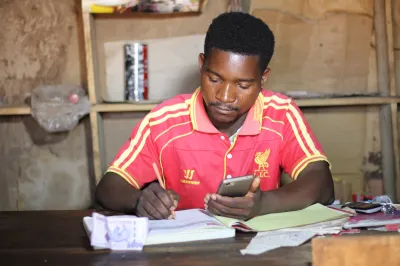FI2020: Scarcity, Tunneling and Financial Inclusion
This post, Kate McKee's reflection on a panel discussion at the recent FI 2020 conference in London, originally published on the Center for Financial Inclusion's blog. An excerpt follows.
Research by Sendhil Mullainathan, co-author of the recently-published book Scarcity (reviewed on this blog by CFI’s Sonja Kelly here) and others has documented how the constant worry and distraction of living with too little – what Sendhil and his co-author Eldar Shafir refer to as “tunneling,” with its intense focus on making ends meet day-to-day – ultimately affects poor people’s ability to make good decisions. Basically, this growing body of research shows that when people are in a situation of scarcity, they are not as smart, not as able to resist temptation, and are less likely to be able to make and stick to a plan, as compared to themselves in a time of less scarcity.
 Kate McKee leads a panel at the FI2020 conference.
Kate McKee leads a panel at the FI2020 conference.
Phot0 Credit: Center for Financial Inclusion
This scarcity framework and evidence has potentially powerful consequences for financial inclusion. The panel that followed focused on how scarcity, the bandwidth tax, and tunneling affect the relevance, uptake, and usage of financial services by lower-income people.
One of the key insights was entry products need to meet a really immediate need. They need to be ‘in the tunnel’ of what the customer is focused on to meet their day-to-day needs. Obviously mobile telephony is firmly in the tunnel virtually everywhere in the developing world. Person-to-person money transfer has also passed the “tunnel test” of rapid uptake in an increasing number of markets – Kamal noted that he felt the company had reached an important tipping point when “bKash” had become a verb commonly used across Bangladesh. Tine made the point of needing excellent execution and recruiting the right kind of agents that customers will trust, in order for customers not to have extraneous worries that would prevent them from really being able to make decisions.




Add new comment